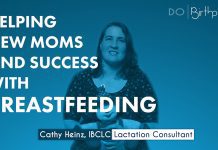Breastfeeding Essential Info
ANSWER: “Around 16 weeks of gestation, your body actually starts to produce colostrum, which is the baby’s first milk and it’s rich and protective anti infectious properties, so right after birth, that’s available to your baby and it’s going to be your baby’s first needs. During those first few days, colostrum comes in very small quantities and your baby’s stomach is really only came about the size of the marble on the first day of life, so baby’s going to need to feed regularly and frequently to satisfy their needs. And that also it has the second purpose of bringing in your milk supply. These frequent feeds or also known as cluster feeding and they have a biological purpose. Sometimes these cluster feedings, can be perceived as baby’s not getting enough, but again, they have a biological purpose which is it’s your baby queuing your body to ramp up the milk supply and to bring in your mature milk volumes.
Babies often like to cluster feed at night time when the world sort of quiets down and it’s more similar to the environment they had in the womb where everything was a little bit muted. Night time, when it’s quiet and dark, feel safe to a baby and that’s when they can sometimes wake up and rouse and really start to explore their environment, so feeding at nighttime is a very regular thing during those first few days, stick with it! Around day three to five is when you’re mature, milk volumes will come in. Your breasts may become engorged or just feel an extra level of fullness. You’ll perceive that as having an extra full breast, maybe a little bit warm and slightly uncomfortable. This is because of increased blood flow to your breasts, as well as increased milk volumes as well as some swelling in your breasts.
So the best thing to do during this time is to feed your baby regularly. What we want to have when the milk volumes come is, is we want your baby to take as much of that as they can. This is really going to help your body set it’s rate for milk production and your baby. You can trust your baby lead. Let your baby lead as far as when they want to feed, always offering the breast at least every three hours. Cluster feeding is going to come and go during these first few weeks and so long as your baby is peeing and pooing, trust your baby as far as this goes. This is your baby telling your body how much it needs as it’s continuing to do this rapid rate of growth. Some women experience nipple sensitivity during these first few weeks. Most characterize this as being mild, but pain is subjective to every woman.
What you want to be sure is that when you’re feeding your baby, that when your baby comes off, you want your nipple to be in the same shape that it was when your baby went on. If you’re noticing that your nipple is pinched or creased, or if you find that you’re getting scabbing, that’s a good time to ask for some support to help work on the babies latch. Working on the latch early will help you to continue breastfeeding. So during these first weeks of breastfeeding, this is really important time to be patient with yourself, to be patient with your baby, and to explore the many different positions that you have. To find something that works for you and your baby as individuals. Reach out to other women who have breast fed and if you feel that you need extra support, ask your midwife, ask your doctor or reach out to an experience breastfeeding counselor or lactation consultant.”










